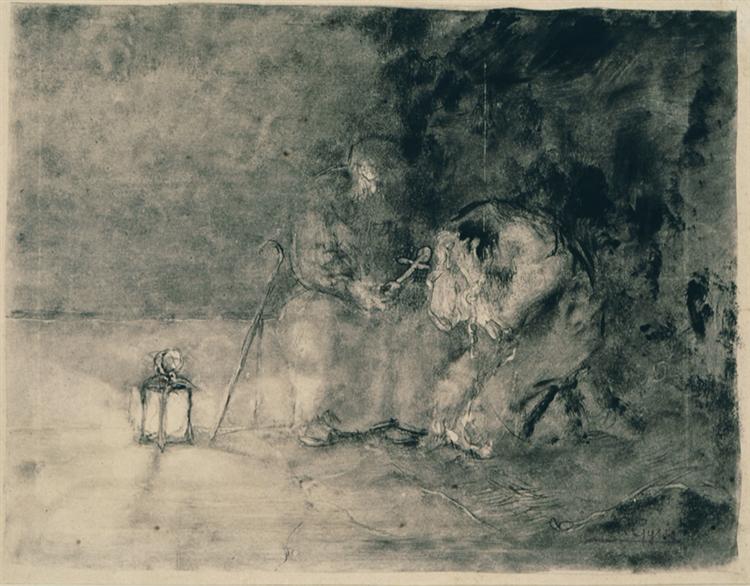Genesis 3:15
Matthew 4:1-11
February 21, 2021
“The Lord God said to the serpent, …
‘I will put enmity between you and the woman,
And between your seed and her seed;
He shall bruise your head,
And you shall bruise his heel.’” (Genesis 3:15)
When Adam sinned, he plunged the entire human race into sin and death. St. Paul explains, “Therefore, just as sin came into the world through one man, and death through sin, and so death spread to all men because all sinned…” (Romans 5:12) And so, it is expected that our God, who created the world to be good and who warned Adam against eating the forbidden fruit, would punish those who sullied his once perfect creation. Yet, even in his doling out of punishment, our God shows his immense mercy and grace. While it is true that our sins merit us eternal damnation and separation from God, the punishments God gave to Adam and Eve that day were temporary and they did not even remove the earthly blessings he gave us in creation. Yes, the woman would experience great pain in child-bearing and would have strife as she struggled against submitting to her husband, yet God still blessed the woman with children and with a husband. Yes, the man would experience pain and fatigue in his work and would eventually die and leave all his riches behind him, yet God still blessed him with food, clothing, and all that he needs for his body and life.
Yet, to the serpent, Satan himself, God declared the ultimate punishment, complete destruction. And it is in the punishment of Satan that God first declares the promise of our salvation. God says, “I will put enmity between you and the woman and between your seed and her seed; he shall bruise your head, and you shall bruise his heel.” God has put enmity between the devil and the mother of all the living. The serpent is Satan. This is not just any serpent. A snake is an animal not capable of enmity. Satan is a fallen angel, who possessed the serpent in order to tempt Adam and Eve into sin. Satan is at enmity with the woman and all her children. Satan is our enemy. In order for us to be saved, Satan must be defeated. So, in the very hour that Adam and Eve sinned, God promised their salvation by promising Satan’s defeat. The seed of the woman would bruise the serpent’s head. The bruising of the serpent’s head is the defeat of Satan. This will be accomplished through no one else that Jesus Christ, who was wounded for our transgressions (Isaiah 53:4).
Satan is your enemy. In fact, the word Satan comes from the Hebrew word for adversary. Satan is the archenemy of God and his Church. If Satan is not your enemy, then you are his slave and he is your abusive father. But if God is your good and gracious Father, then Satan must be your enemy. Satan is the number one thing that stands between you and eternal life in heaven. For you to enter heaven, Satan must be defeated.
Satan attacks you in two ways. First, he tempts you into sin. Second, he accuses you of sin in order to bring you to despair and unbelief. He tempts you into sin by lying. Jesus spoke to those Jews who refused to believe in him, “You are of your father the devil, and your will is to do your father’s desires. He was a murderer from the beginning, and does not stand in the truth, because there is no truth in him. When he lies, he speaks out of his own character, for he is a liar and the father of lies.” (John 8:44).
Satan lies. That is how he leads you into sin. “Did God really say?” That’s his trick. Yes, that’s it. He questions God’s Word, whether God’s Word is true, whether it means what it clearly says, whether it is clear, whether it is God’s Word at all. Yet, he uses the constant pressure of the sinful world and the corruptness of your own sinful heart against you. So, while in theory it seems quite simple to resist Satan’s lies (simply believe God’s Word), he succeeds against you over and over again, until your heart feels hollow and your sins pile up on your conscience and go over your head (Psalm 38:4).
And then Satan brings in his second way of attack. He accuses you. St. John records in Revelation chapter 12, “And the great dragon was thrown down, that ancient serpent, who is called the devil and Satan, the deceiver of the world….” And God’s people cried, “Now the salvation and the power and the kingdom of our God and the authority of his Christ have come, for the accuser of our brothers has been thrown down, who accuses them day and night before our God.” This is what Satan does. He accuses us of the sins he himself has lured us into committing! And he is so brazen as to accuse us before the throne of God, as he did against God’s servant Job! In fact, the name devil comes from the Greek word for slanderer or accuser. The devil slanders and accuses us to our conscience and to our God.
So, in order for God to rescue us from Satan, he must rescue us from these two attacks of the devil: the devil’s lies, by which he tempts us into sin and the devil’s accusations, by which he draws us to despair and unbelief. Jesus Christ is our champion, who defeats Satan against both these attacks.
Jesus is the seed of the woman. It is peculiar that Scripture refers to the woman’s seed. Seed is something a man has. Usually when the Bible refers to someone’s seed, it refers to the descendants of fathers. But here, God speaks of the woman’s seed in order to prophecy the virgin birth of Jesus to his mother Mary. Jesus was born of a virgin, which is impossible by the natural course of things, because he is God. God himself, the eternal Son of the Father, came to fight Satan for us in human flesh. St. Paul writes, “But when the fullness of time had come, God sent forth his Son, born of woman, born under the law, to redeem those who were under the law, so that we might receive adoption as sons.” (Romans 5:4)
The Son of God obviously had no need for himself to be under the law or to fulfill the law’s demands. Yet, he did so in human flesh in order to be our substitute. Jesus was obedient under the Law in our place. Through faith, we receive everything Jesus has. Jesus in our human flesh obeyed the Law, so through faith we receive his obedience. St. Paul writes in Romans chapter 5, “Therefore, as one trespass led to condemnation for all men, so one act of righteousness leads to justification and life for all men. For as by one man’s disobedience the many were made sinners, so by one man’s obedience the many will be made righteous.” We are made righteous, not by our own obedience, but by Christ’s obedience, which we receive through faith.
Again, St. Paul writes, “Now to the one who works, his wages are not counted as a gift but as his due. And to the one who does not work but believes in him who justifies the ungodly, his faith is counted as righteousness.” Through faith, we receive the credit for the obedience of Christ, just as Abraham believed God’s promise and it was counted to him as righteousness (Romans 4:3; Genesis 15:6).
“And you shall bruise his heel.” This refers to Jesus’ crucifixion. Jesus would be the perfect sacrifice for our sins. But in order to be a sacrifice for our sins, he needed to fulfill the Law in our place and be blameless like a lamb without spot or blemish. This is why the author to the Hebrews confesses Christ to be the perfect High Priest, he writes, “For we do not have a high priest who is unable to sympathize with our weaknesses, but one who in every respect has been tempted as we are, yet without sin.” (Hebrews 4:15)
This means that what we witness in Jesus’ temptations from Satan in the wilderness is our victory over Satan. Satan lied to Jesus. He denied God’s Word, he twisted God’s Word, he ignored God’s Word. Yet, Jesus in human flesh wielded the same weapon that is available to us humans. Jesus did not cast Satan away by his Divine power, but he strove with him as a man armed with God’s Word. And as a man, he defeated Satan’s lies. Jesus, our champion won.
This also means that the devil’s second attack is impotent against us. What can Satan accuse us of? Sin? What sin? Jesus is our substitute. He couldn’t get Jesus to sin. We receive Jesus’ obedience through faith. Satan’s mouth is shut by the obedience of Christ. In that Revelation passage, which I read earlier, where the people of God rejoice that Satan, the accuser has been cast down, it goes on, “And they have conquered him by the blood of the Lamb and by the word of their testimony.” When Satan accuses you of sin, through faith, you have the right to say to Satan, “You lost. You strove with the man Jesus and you failed. You couldn’t make him sin. Yet, he has paid the debt of my sins. You cannot accuse me. I have Jesus. If you are to accuse me, you must accuse Jesus first, and I know you can’t, because I saw you lose to him in the wilderness.” That is the confidence that Jesus’ victory gives us. It gives us confidence to withstand the devil’s accusations against even our most grievous sins. This is not brazenness or impenitence over our sin. Rather, this is confidence in Jesus’ victory over Satan, in the success of his passion and death over our sins. It is confidence that Jesus’ blood washes us clean and that God’s promise of forgiveness is true.
The seed of the serpent also is at enmity with the Seed of the woman, Jesus Christ. Of course, Satan, being a spirit, cannot have physical seed. His seed are those who believe his lies and obey his will. That is why Jesus told the Jews that hated him that their father was the devil. They were obedient to Satan. Those who are obedient to Satan are at enmity with Christ. But those who are obedient to God are at peace with him. Adam was disobedient to God and brought us into enmity with God. So, our obedience to God must bring us into reconciliation with God.
Yet, how can we be obedient to God? An obvious answer is to follow the Ten Commandments. Yet, how do we do this? When we look at Satan’s temptation of Jesus, we see that he tempts Jesus to break the first three commandments. By telling Jesus to turn stones into bread, he was tempting Jesus to despise God’s Word, which is breaking the Third Commandment. Jesus resists temptation by saying that man does not live by bread alone, but by every word that comes from the mouth of God. By selectively edition Scripture, Satan tried to tempt Jesus into testing God by leaping from the pinnacle of the temple. This would be breaking the Second Commandment, “You shall not misuse the name of the Lord your God.” And finally, by tempting Jesus with the glory of the world in order to get him to worship Satan, he tempted him to break the First Commandment, “You shall have no other gods.” Yet, Jesus correctly declared that you should worship and serve the Lord God alone. These three commandments make up the First Table of the Law, “You shall love the Lord your God with all your heart, soul, strength, and mind.”
Jesus perfectly teaches us how to resist temptation and be obedient to God. However, even with Jesus’ perfect example, the commandment still depends on us doing it in order to be obedient. Yet, we do not accomplish it. We fail to be perfectly obedient by our works. The only way we can be truly obedient is through faith in Jesus’ obedience. The Commandments demand love. We cannot love God if he hates us. We can only love him if he loves us. And we can only receive his love through faith in Christ Jesus, who was obedient on our behalf. It is through the obedience of faith that we are rescued from the oppression of Satan. And it is through walking in faith in Christ Jesus that we trample Satan under our feet. Amen.





 RSS Feed
RSS Feed